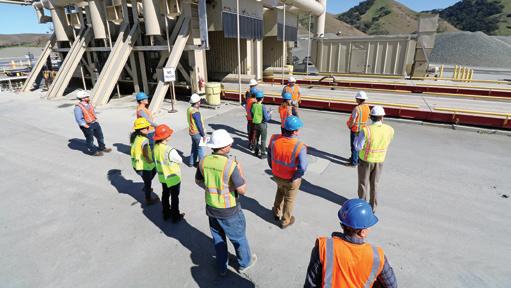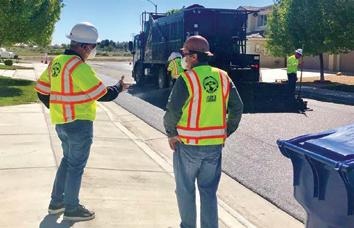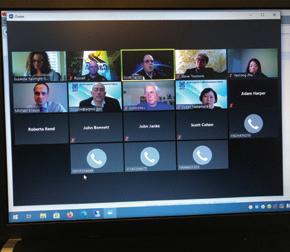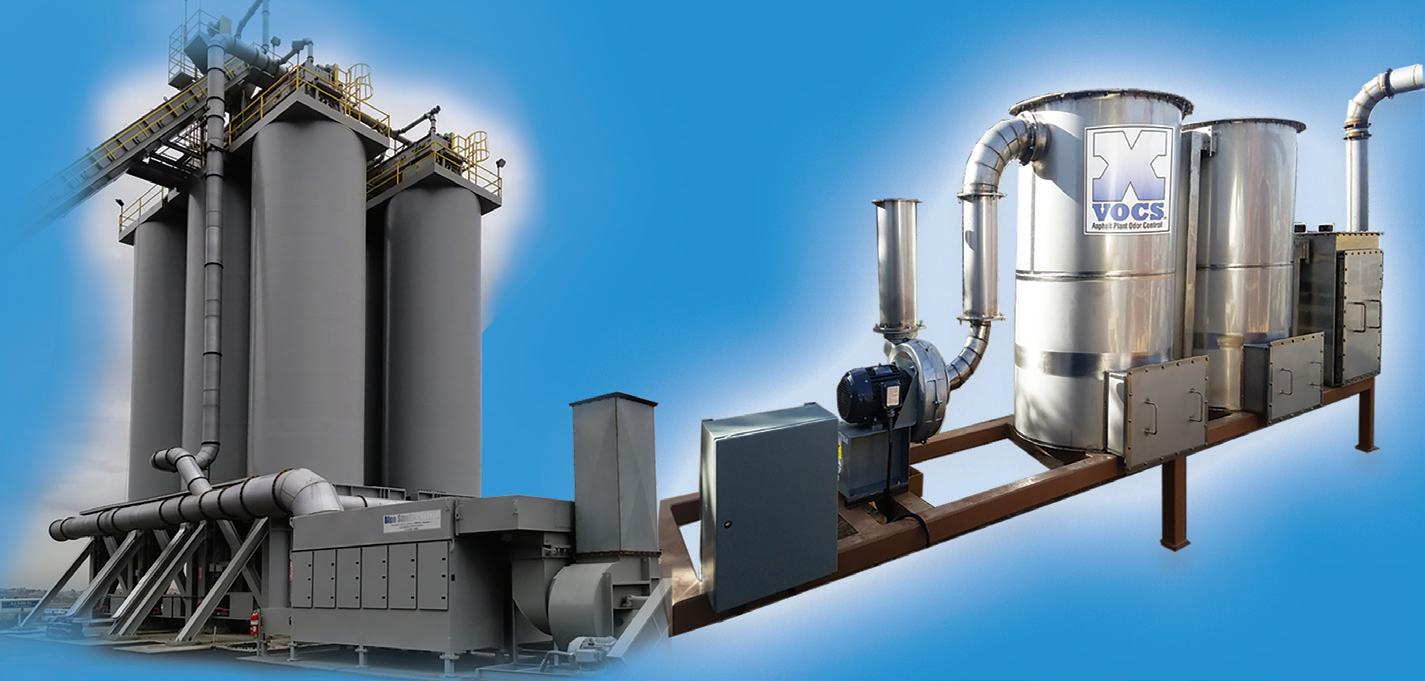
24 minute read
Rapidly changing events driven by the coronavirus / COVID-19 pandemic challenged the asphalt pavement industry in California
By Russell W. Snyder, CAE
There’s nothing in the construction playbook about pandemics. No matter. When the coronavirus/ COVID-19 public health emergency swept across California this Spring, the asphalt pavement industry, and the association representing it, sprang into action to help keep the state’s vital transportation infrastructure operational and safe, and extending a helping hand to those in need.
By June 1, with more than 100,000 confirmed cases of COVID-19 in California, and 4,000 deaths, the state struggled to emerge from under a series of public health “stay at home” orders put in place to slow the spread of the virus, which that shocked the economy, disrupted lives and sent waves of anxiety sweeping across the Golden State.
“By no stretch of the imagination is this virus behind us,” Gov. Gavin Newsom warned recently. “We’re moving forward. We’re not looking back. But we are walking into the unknown.”
Indeed, the unknown is a recurrent theme of this pandemic, the effects of which could be felt for years. The coronavirus is invisible and highly contagious. The potentially deadly COVID-19 disease that results in some who contract it, coupled few treatment options and no known cure, brought the possibility that hospitals could be overwhelmed with the sick and dying.
For an industry with a “can-do” ethos, the pandemic was a new challenge to be overcome, a test of character, and pushing the limits of our ability to adapt, and adapt quickly. It turned conventions and routines on their head. What emerged from the chaos, fear and confusion was a new way of thinking about workers, jobs and communities, and how we’re all interconnected.
From the beginning, the state’s vital infrastructure, long taken for granted, was pushed to the forefront of the public’s consciousness. With millions of Californians staying at home, how would they continue to access essential services? Supply chains were deconstructed and reconstructed to accommodate the new reality. And asphalt pavements, which cover about 95 percent of roads and highways connecting every corner of America’s most populous state, came to represent the lifelines upon which first-responders, shipping companies, delivery services and other essential activities that kept the state functioning in a crisis.
Because events moved so rapidly, keeping up, and responding, became a daily and even sometimes hourly challenge. What follows are some key events along California’s pandemic journey, overlaid at times with national and international events to provide a sense of context. The pandemic blurred time, which is why a timeline is perhaps the best way to take our measure of what 2020 has meant to us so far. CA
Dec. 31, 2019 June 1, 2020
Dec. 31, 2019
The government in Wuhan, China confirmed that health authorities were treating dozens of people for illnesses of unknown origin. Days later, according to media reports, researchers identified it as a new virus. At the time, there was no evidence that the virus was readily spread by humans.
Jan. 11, 2020
The Chinese state media report the first known death from an illness connected to the virus.
Jan. 21, 2020
The first confirmed case is reported in Washington state. The man had recently traveled to Wuhan, China.
Jan. 30, 2020
The World Health Organization declares a “public health emergency of international concern.”
Jan. 31, 2020
The Trump administration announces the first travel restrictions, with exceptions, for those seeking entry to the United States if they have traveled to China within the past 14 days.
The State Asphalt Pavement Association meets in Maui, Hawaii in conjunction with the National Asphalt Pavement Association annual meeting the following week. At least one attendee reports flu-like symptoms and does not attend a group function.
Feb. 6, 2020
One of the first reported deaths in California from the coronavirus occurred in Santa Clara County, health officials would later report, although they acknowledged that other deaths may have happened earlier but went undiagnosed.
Feb. 11, 2020
The respiratory disease caused by the coronavirus is named “COVID-19” by the World Health Organization.
Feb. 20, 2020
The published Caltrans Statewide Crude Oil Index is 350.5. The posted price is used for calculating payment adjustments for paving asphalt under the special provision section “Payment Adjustments for Price Index Fluctuations” in those projects containing that contract provision.
Skip Brown teaching an in-person class Feb. 25.

Feb. 29, 2020
The first publicly reported death in the United States related to the coronavirus was a patient near Seattle. Other deaths happened earlier, it would later be determined.
March 3, 2020
The CalAPA ® Environmental Committee coordinates with DeSilva Gates Materials to host a plant tour in Sunol for employees of the California Air Resources Board and the San Francisco Bay Area Air Quality Management District. Some did not attend due to concerns circulating in the media about a COVID-19 outbreak in the Bay Area.
CalAPA ® members and representatives from the California Air Resources Board and the San Francisco Bay Area Air Quality Management District attend an asphalt plant tour in Sunol March 3 hosted by DeSilva Gates.

March 10, 2020
CalAPA ® announces that one of its technical training classes scheduled to take place on April 8 in San Jose, hosted by the City of San Jose, will be postponed indefinitely. In addition, the Caltransindustry Joint Training & Certification Program announced that the “Hot Mix Asphalt I” class scheduled to take place March 21-24 on the campus of San Jose State University has been postponed indefinitely.
March 11, 2020
The National Basketball Association announces it is suspending its 2019-20 season after a Utah Jazz player tests positive for COVID-19. Other professional sports leagues would follow suit.
March 12, 2020
Reacting to recent COVID-19 news, the Dow Jones Industrial Average closes at 23,533.22, down 5.9 percent from the previous day. Other equity markets suffered similar declines. Major League Baseball announces it is postponing the opening of its season, which was scheduled to begin on March 26.
March 13, 2020
President Trump declares a national emergency related to the pandemic.
At a meeting with executive managers of the California Air Resources Board, CalAPA ® verbally requests that the agency suspend the rule-making process with regard to the Reporting Criteria for Toxic Air Contaminants (AB617), and pledges to follow up with a formal written request at a later date.
CalAPA ® announces that its planned Spring Asphalt Pavement Conference, scheduled for April 15-17 at Disney’s Grand Californian Resort & Spa, is in jeopardy of being cancelled due to public health orders. Scores of people had already registered and made travel arrangements. The association pledged to issue full refunds to all registrants if the event is cancelled.
The massive ConExpo-Con/Agg, held at the Las Vegas Convention Center, closes a day early due to COVID-19 concerns. Total registered attendance, including many from the asphalt industry in California, exceeded 130,000.
March 16, 2020
Caltrans releases guidance to contractors in the form of a “Construction Policy Directive” on how they may proceed with work during the COVID-19 pandemic, including how the situation may impact the definition of “working days” under Caltrans contracts. Caltrans also announced it was temporarily shutting down its regional office in Oakland after an employee who worked on the 8th floor tested positive for COVID-19.
CalAPA ® announces that it would make all COVID-19-related information publicly available via its new Safety Page on the association’s website. CalAPA ® also announces that, due to public health orders, all employees would work remotely and that association meetings and educational services would be provided via remote technologies until further notice.
March 17, 2020
Several San Francisco Bay Area counties issue broad “stay at home” orders intended to slow the spread of the coronavirus, requiring many businesses to cease operations. Construction activity was deemed “essential” and exempted from the order under certain conditions.
As it pledged to do at a March 13 meeting, CalAPA ® follows up with a formal letter to the California Air Resources Board requesting the board suspend the rule-making process with regard to the Reporting Criteria for Toxic Air Contaminants (AB617). The COVID-19 pandemic “will severely compromise our industry’s ability to provide meaningful analysis and feedback to the proposed rules,” the CalAPA ® letter states.
The State Building & Construction Trades Council of California, AFL-CIO, issues interim COVID-19 health and safety guidelines for construction workers. Orange County public health officials issue sweeping COVID-19 orders but still categorize construction as “essential” and exempt from the “stay at home” order.
March 18, 2020
The Caltrans-industry Joint Training & Certification Program releases interim guidance on how the COVID-19 situation will impact the program, including class postponements, certification extensions and the criteria for provisional certifications. The National Asphalt Pavement Association (NAPA) sends a letter to the Federal Highway Administration (FHWA) on the importance of continuity of work during the pandemic.
March 19, 2020
California Gov. Gavin Newsom becomes the first governor in the nation to issue a statewide “stay at home” order in response to the pandemic. Construction activity is designated as “essential” and exempt from the order. Significantly, the governor announces that individual counties could issue orders more restrictive than the statewide order.
March 20, 2020
The published Caltrans Statewide Crude Oil Index is 297.3.
March 21, 2020
The California Department of Public Health reports that there are 1,468 confirmed cases of coronavirus in California and 27 deaths.
March 22, 2020
The Governor’s Office updates its guidance as to what constitutes an “essential” activity exempt from the “stay at home” order, specifically adding “construction materials.”
March 23, 2020
The Dow Jones Industrial Average closes at 18,591, down from 29,551 as recently as Feb. 12.
In an unprecedented move, CEOs from eight California-based construction trade associations, including CalAPA ® , met via conference call to coordinate strategy, messaging and advocacy with regard to the pandemic. Among the first results of the coordination was a coalition letter sent to CalOSHA seeking guidance on how to identify and report COVID-19 cases. Caltrans also announced it was granting extensions on lab certifications, inertial profiler training and MPQP portable equipment, such as asphalt rubber blending units.
CalAPA ® receives informal notification from Disney that they will not be able to accommodate the association for its Spring Asphalt Pavement Conference, which had been scheduled for April 15-17 at Disney’s Grand Californian Resort and Spa. The association closed registration and issued full refunds to all who registered for the event.
March 24, 2020
The Tokyo Olympics, scheduled for July, are postponed until 2021, officials announce. Caltrans issues interim COVID-19 guidance to the construction industry. The department reports few disruptions of more than 700 ongoing construction projects.
March 25, 2020
The CalAPA ® Legislative Committee meets by conference call and is informed that the Legislature will continue to operate, albeit in a highly constrained manner, and that Constitutional mandates such as passing a budget by June 15 will be followed. There is broad recognition that the upcoming May revision of the state budget will bear little resemblance to the initial budget that was released in January, reflecting the massive job losses, reduced tax revenue, and additional costs to respond to the pandemic.
March 26, 2020
Caltrans issues two new guidance documents with regard to updating a Code of Safe Practices incorporating elements related to COVID-19, and Alternative Dispute Resolution guidance.
March 27, 2020
NAPA, as part of the Construction Industry Safety Coalition, releases an updated “Exposure Prevention, Preparedness and Response Plan for the Construction Industry.” NAPA also hosts a labor law and safety webinar to discuss various issues, tools and resources. The California Department of Public Health reports 4,643 positive cases of coronavirus and 101 deaths in California. The CARES Act (House Resolution 748, or the “Coronavirus Aid, Relief, and Economic Security Act”), to provide $2.2 trillion in COVID-19 assistance, is signed into law by President Trump.
March 28, 2020
The U.S. Department of Labor releases updated guidance with regard to labor laws and how they may be impacted by the COVID-19 crisis nationally and in the states, as well as the impact of recent federal legislation to assist companies and individuals.
March 30, 2020
Transportation California, supported by CalAPA ® , sends a letter to Gov. Gavin Newsom reinforcing the construction industry’s commitment to safety for its employees and the communities they serve.
March 31, 2020
Several San Francisco Bay Area counties issue further restrictions on their original “stay at home” orders that puts a halt on most commercial and residential construction.
The City of Los Angeles, Department of Building & Safety, releases guidance warning that city inspectors may take action if they witness unsafe practices on a job
CalAPA ® Executive Director working from his home office in Davis.
site, including various COVID-19 related mitigation measures. “Construction industry employers shall develop a comprehensive COVID-19 exposure control plan,” the guidance states, adding, “Failure to comply with this guidance shall be deemed as creating unsafe conditions and may result in withheld inspections or shutting down of the construction site until corrected.”
A CalAPA ® Southern California Paving Contractor mixer event scheduled for Anaheim is cancelled due to COVID-19 health restrictions on public gatherings.
April 1, 2020
Caltrans releases new guidance with regard to source inspection procedures during the pandemic.
CalAPA ® hosts a statewide “webinar” bringing together members of various regional technical committees, including CalAPA ® members and public agency representatives. It is attended by more than 70 people.
April 2, 2020
The Spring issue of CalAPA ® ’s official magazine, California Asphalt, is published on-line. The COVID-19/emergency response-themed issue includes articles on crisis communications, remote meetings and telework and construction partnering.
April 3, 2020
The U.S. Centers for Disease Control & Prevention releases updated guidance recommending the use of face coverings to help control the spread of coronavirus. Previously the agency had stopped short of making the recommendation, fearing it could contribute to a critical shortage of medical-grade masks for health workers.
April 4, 2020
The California Department of Public Health reports 13,438 confirmed cases of coronavirus and 319 deaths in California. Health officials in Riverside County advise anyone leaving the house to wear a face covering.
April 5, 2020
The non-partisan Legislative Analyst’s Office issues a report foreshadowing major impacts to the states’ finances due to the coronavirus pandemic and the public health response.
April 6, 2020
Los Angeles County releases updated COVID-19 health guidance, which includes the recommendation that people who travel outside their homes wear face coverings. [ Continued on page 26 ]
YOUR RESOURCE FOR CALIFORNIA ROADS.
Ergon is proud to be the go-to roadway resource for California. We specialize in meeting your preservation and maintenance needs, providing education and training, roadway evaluations and on-site technical support. Visit ergonasphalt.com to learn how we can put our resources to work for you.
14929 Slover Avenue, Fontana, CA 92337

■ 909.829.0505
[ Continued from page 24 ]
April 7, 2020
Los Angeles Mayor Eric Garcetti issues an order requiring nonmedical workers to wear non-medical grade face coverings.
April 8, 2020
The Contractor State License Board announces new options for contractors to renew their licenses.
April 9, 2020
Valero and the Valero Energy Foundation commits $100,000 to support local organizations on the front lines of responding to the COVID-19 pandemic. The support is part of an overall $1.8 million commitment in community assistance, primarily in cities where it operates. The donation is one of many, large and small, made by CalAPA ® members across the state to help first-responders, local food banks and other charities.
April 10, 2020
The U.S. Occupational Safety & Health Administration issues guidance on how employers should classify and report incidents where workers may have contracted COVID-19, with some important exceptions.
April 11, 2020
The California Department of Public Health reports 21,794 confirmed cases of coronavirus cases and 651 deaths in California.
April 13, 2020
The governors of three Western states, including California, announce a framework for loosening COVID-19 restrictions in a coordinated way. No date was given for implementation.
CalAPA ® Executive Director Russell Snyder is quoted in a story that appeared in the Sacramento Bee newspaper on the opportunity for accelerating road-improvement projects during the COVID-19 health emergency, which has resulted in a substantial reduction in traffic.
NAPA releases updated guidance on respiratory protection for construction workers.
April 14, 2020
The California Department of Motor Vehicles announces it will grant extensions for those with soon-to-expire drivers’ licenses, including commercial truck licenses, as well as the ability to seek extensions on-line. Caltrans releases guidance to contractors on how the department will notify the contractor when a department employee is suspected of having contracted the coronavirus.
April 15, 2020
The CalAPA ® Board of Directors meets for the first time in history via conference-call only. The previous in-person meeting, which was to be held at Disney’s Grand Californian Resort as part of the Spring Asphalt Pavement Conference, which was canceled. At the Board Meeting the results were reported of a survey of CalAPA ® members regarding the impact of the COVID-19 pandemic to their operations.
April 16, 2020
A state legislative analyst tells the Senate fiscal subcommittee that California is likely in a recession, and that the projected state government budget deficit is likely to be $35 billion in the near future, and likely to rise to an additional $85 billion in the years to come due to the COVID-19 pandemic.

State Sen. Scott Wilk, R-Santa Clarita (right), visits an asphalt paving operation in the City of Lancaster on April 16. Pavement Recycling System’s Steve Ward is at left.

CalAPA ® and other construction trade associations join together in a letter to urge CalOSHA to follow federal guidance with regard to recording and reporting COVID-19 cases.
A screen capture of a Zoom meeting held April 16 between CalAPA ® and CalCIMA staff and members, and representatives of the South Coast Air Quality Management District.
At a meeting of the Caltransindustry Pavement & Materials Partnering Committee, Caltrans reported that they are seeking industry input on a guidance document with regard to the use of contact-less load ticketing options on Caltrans projects. CalAPA ® surveys members and other states on the topic and provides that information to Caltrans.
CalAPA ® member Pavement Recycling Systems hosts a state elected official, state Sen. Scott Wilk, to visit an asphalt paving operation in the City of Landcaster while wearing proper protective face coverings and keeping proper distance from workers.
April 17, 2020
Gov. Gavin Newsom announces the creation of an advisory group to develop a plan to transition the state out of COVID-19 restrictions. The group includes four former governors and former presidential candidate Tom Steyer.
Transportation California, a CalAPA ® partner, sends a letter to congressional leadership urging prompt action with regard to federal transportation funding.
The California Department of Public Health reports 28,963 confirmed cases of coronavirus and 1,072 deaths in California.
April 20, 2020
Global oil prices plunge into negative territory for the first time in history as demand evaporates. The published Caltrans Statewide Crude Oil Price Index is 172.7, down from 350.5 on Feb. 20.
April 23, 2020
Los Angeles County emerged as one of California’s coronavirus “hot spots.” There were a reported 18,517 people infected in the county and 848 deaths, according to an official tally. Los Angeles County, which represents about a quarter of the state’s population, was logging about half of the state’s coronavirus cases and deaths.
CalAPA ® ’s “Asphalt Pavement 101” technical training class, held in on-line “webinar” format, is one of the most well-attended ever, with more than 50 registered.
April 24, 2020
The California Department of Public Health reports 39,294 confirmed cases of coronavirus and 1,562 deaths in California.

Roger Smith, a CalAPA ® technical trainer, teaches an “Asphalt Pavement 101” class April 24 in “webinar” format. A record 67 industry and agency personnel attended.
April 28, 2020
Gov. Gavin Newsom releases a “framework” for reopening the state’s economy.
A construction industry coalition, including CalAPA ® , write a letter to Gov. Gavin Newsom, recommending that COVID-19 exposure assumptions with regard to construction activity be treated differently than those of health care workers and other first-responders.
CalAPA ® ’s “Asphalt Pavement 101” technical training class, held in “webinar” format, is attended by a record 67 attendees.
Caltrans announces it is working on a draft proposal to implement paperless weight tickets for construction materials, and seeks asphalt industry input to the draft by May 20.
April 29, 2020
Several San Francisco Bay Area counties announce they have extended their “stay at home” health orders through May 31, but lift restrictions on commercial construction as long as certain public health and safety criteria are met. The addition of a “COVID-19 Safety Compliance Officer” requirement creates controversy within the construction community.
Several CalAPA ® members are featured on a national Fox News TV report about road improvements in California accelerated during the COVID-19 health emergency due to low traffic volumes on the road.
May 2, 2020
The California Department of Public Health reports 53,616 confirmed cases of coronavirus and 2,215 deaths in California.
May 4, 2020
The California Legislature returns to Sacramento after an extended absence due to the COVID-19 situation.
May 6, 2020
Gov. Gavin Newsom issues an Executive Order that establishes a “rebuttable presumption” for essential workers to access workers’ compensation benefits if they contract COVID-19. The order sparks further controversy within the construction industry, which argues that the nature of COVID-19 and how many people can contract it but show no symptoms make it impossible to determine if the exposure was work-related in non-hospital settings.
CalAPA ® hosts a statewide technical committee meeting utilizing remote “webinar” technology and 88 members and public agency representatives participate, the largest turnout for such a meeting in association history. Presentations include an update on the Caltrans-industry Joint Training & Certification Program for materials technicians, and a technical presentation on polymer-modified binders.
May 7, 2020
The Newsom administration predicts the state budget deficit will balloon to $54.3 billion, the largest in state history.
CalAPA ® sends a letter to members of the California Congressional delegation urging them to support the $49.9 state Department of Transportation assistance proposed by the American Association of State Highway & Transportation Officials (AASHTO).
May 8, 2020
The state’s non-partisan Legislative Analyst’s Office predicts the state’s budget deficit will be somewhere between $18 billion and $31 billion, and announces that the state has already plunged into one of the deepest economic downturns in history.
May 11, 2020
Gov. Gavin Newsom, in a news briefing, warns that unemployment in California could reach above 20 percent, which is approaching levels not seen since the nadir of the Great Depression in 1933.
May 13, 2020:
The State Asphalt Pavement Association Inc. (SAPA), including CalAPA ® , sends a letter to all members of the U.S. Senate and House of Representatives throwing their support behind a proposal by the American Association of State Highway & Transportation Officials (AASHTO) urging Congress to allocate $49.9 billion capital highway construction and other critical transportation programs over the next 18 months. A Transportation California analysis estimated the proposal would bring $4.5 billion for California.
May 14, 2020:
Gov. Gavin Newsom releases a revised state budget for the fiscal year 2020-21 that begins July 1. The $203.3 billion spending plan is substantially smaller than the original budget released in January and projects a $54 billion deficit. Transportation spending remains largely intact, including the budget for the California Department of Transportation, which projects no layoffs in its $15.4 billion budget.
May 15, 2020:
The U.S. House of Representatives passes a $3 trillion Coronavirus stimulus package (House Resolution 6800, the “Health and Economic Recovery Omnibus Emergency Solutions Act – HEROES”), but its fate appears to be precarious in the Senate. If passed, it would be the fifth, and largest, corornavirus-related economic stimulus bill passed by Congress. The signature feature of the legislation is $15 billion in assistance to state Departments of Transportation. A Transportation California analysis of the bill estimated California’s share of the assistance would amount to $1.4 billion.
CalAPA ® sends a letter to the California Department of Insurance supporting a proposal that would exclude COVID-19 claims from being used to calculate an employer’s Experience Modification, which s used to calculate workers’ compensation insurance rates. The letter is in response to a May 6 Executive Order issued by Gov. Gavin Newsom.
May 16, 2020
The California Department of Public Health reports there have been 78,839 confirmed cases of COVID-19 and 3,261 deaths in California.
May 21, 2020
The Transportation Construction Coalition, supported by the National Asphalt Pavement Association, holds a virtual “fly-in” to Washington, D.C. attended by nearly 1,000 participants. Former CalAPA ® Chairman Jeff Reed of George Reed Inc., currently serving as chairman of the Association of Equipment Manufacturers, introduces U.S. Sen. Tom Carper, D-Del, Ranking Member of the Senate Environment & Public Works Committee. At the meeting NAPA unveils a grass-roots website to promote federal transportation funding: www.hardhatsforhighways.org
May 22, 2020
The California Department of Employment Development reports that California unemployment rose to a record 15.5 percent in April. The state has shed 2, 344,700 non-farm payroll jobs. The unemployment rate spiked an unprecedented 10 percent in April, eclipsing the previous record high rate in the modern era of 12.3 percent at the height of the Great Recession in March, October and November of 2010).
May 27, 2020
The death toll in the United States from COVID-19 tops 100,000, according to a tally compiled by Johns Hopkins University. With less than 5 percent of the world’s population, the United States accounts for nearly a third of the deaths attributed to the virus worldwide. Although there have been COVID-19 cases and deaths reported in all 50 states, nearly all were taking steps to drop or loosen their social distancing restrictions. The Dow Jones Industrial Average closes at 25,548, up from its low of 18,591 on March 23 but still well off its 2020 high of 29,551 on Feb. 12.
May 30, 2020
The California Department of Public Health reports 110,583 confirmed cases of COVID-19 in California and 4,213 deaths.
June 1, 2020
CalAPA ® announces it will reopen its West Sacramento offices consistent with recently updated public health guidance issued by the Yolo County Department of Health. CA
The Pavement Specialist Team proudly supports THE WOMEN OF ASPHALT
Sallie Houston Technical Manager Mimi Tran

Molly Gibney

Full-Size Performance, Short-radius Agility and Quiet Operation COMPACT YET TOUGH MINI
www.emultech.com www.slurry.com 916.373.1500
Model : SK35SR-6E Program : 0% for 54 months and 90 Day deferral options for qualifying customers


WORK SMARTER – NOT HARDER
www.scottequip.com Serving California For 50 Years!
SOUTHERN CALIFORNIA’S PREMIER EQUIPMENT DEALER Fontana / 909-822-2200
14635 Valley Blvd., Fontana, CA 92335 SALES • RENTALS • PARTS • SERVICE
Santa Fe Springs / 562-777-0775
10918 Shoemaker Ave., Santa Fe Springs, CA 90670
MINI EXCAVATORS / SKID STEERS BACKHOES / SKIP LOADERS

Best Available Control Solutions for Blue Smoke, Odors & VOC’s in Asphalt Plants

Patented and Proven as Best Available Control
Technology. The most efficient and cost-effective emissions control solutions—now at over 100 hot mix plants nationwide. Amazing New Technology. X-VOCS removes odors and VOC’s such as Hydrogen Sulfide (H2S) from the Hot Mix Asphalt process. Best when paired with our collectors.
Your Reliable Resource For Asphalt PlantSolutions


Butler-Justice, Inc.
Industrial Equipment, Parts& Service
Asphalt Plant Wear Parts, Dust Collectors, Burners, Electric Motors, Belt Scales
5594 E. La Palma Ave. Anaheim, CA 92807 (714) 696-7599 mikeb@butlerjustice.com www.bluesmokecontrol.com www.butlerjustice.com
SINCE 1918 1-800-404-4975
ASPHALT SALES CONTACTS:
Toll Free order Desk: 800-404-4975 Phone: 909-382-7400
CABAZON ASPHALT PLANT:
13984 Apache Trail Cabazon, CA 92230 Phone: 951-849-8280
REDLANDS ASPHALT PLANT:
8397 Alabama St. Redlands, CA 92373 Phone: 909-792-3650
RIALTO ASPHALT PLANT: 3221 N. Riverside Ave. Rialto, CA 92376 Phone: 909-356-0537
www.MatichCorp.com
asphaltsalesgroup@matichcorp.com





